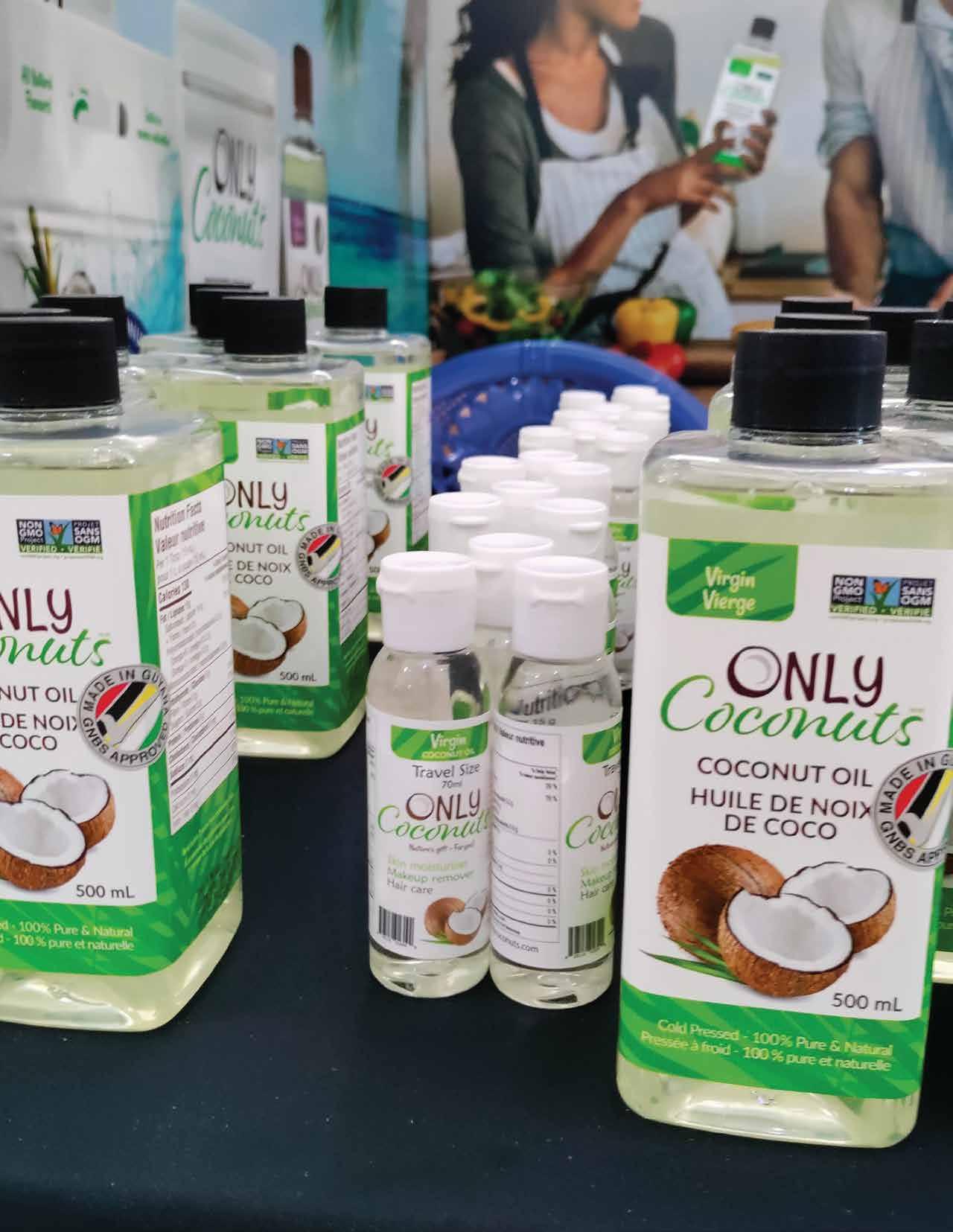
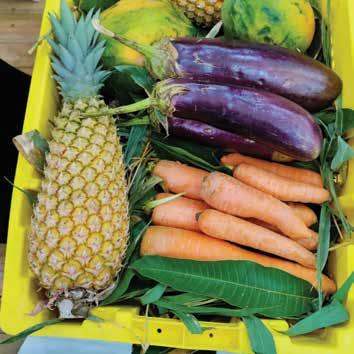
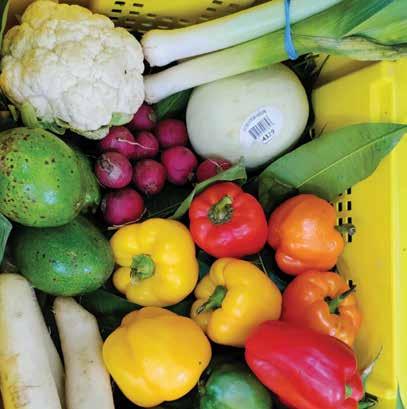
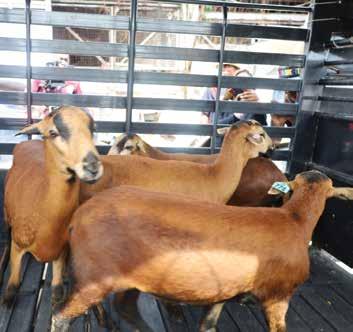
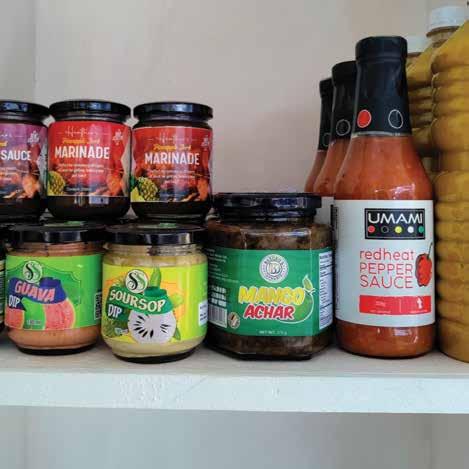






The 25% by 2025 initiative, a concerted effort to put food security and improved food systems on the front burner to foster investment, economic development and prosperity for the CARICOM region, is on track to achieve its goals.
According to CARICOM SecretaryGeneral, Dr. Carla Barnett, the vision of the CARICOM Region is for a climate-smart, sustainable food system that will support the priority objective of achieving food and nutrition security for our citizens.
“CARICOM has been making commendable advancements in innovation and policy reform in agriculture. These gains contribute to the Region’s appeal as a preferred option for Investments. Mobilization of capital will allow our vulnerable economies to increase productivity, enhance resilience to climate change with appropriate technologies, and transport our produce throughout the Region,” Dr. Barnett said.
CARICOM member states, which are highly dependent on wheat, dairy products and processed foods, agreed in 2022 to significantly cut the massive U.S. 6-billion-dollar food import bill.
“It’s a game changer. It’s a vision and strategy that has been gaining steam and we are seeing investments on the ground and commitment from governments at levels we have never seen before,” Shaun Baugh, Programme Manager, Agricultural & Agro-Industrial Development at the Georgetown-based CARICOM Secretariat, told Caribbean Business and Travel.
With the exception of Guyana and Belize, the region is a net importer of food and at least seven countries import more than 80% of the food they consume.
Guyana’s President Irfaan Ali, the lead CARICOM Head of Government with responsibility for Agriculture and Food Security, is the architect of this Initiative. His book “From Crisis to Opportunity: An Innovative Approach to Food Security in the Caribbean Region” identifies the challenges and opportunities in each Member State and the strategies the region needs to implement to be more self-sufficient and stem the outflow of critical foreign exchange.


is supplying 1,000 tonnes of fresh produce to Barbados weekly.
Work is advancing on the regional ferry service, expected to be launched by year end and construction is progressing on Food Terminals to facilitate exports in Guyana and Barbados.
A special Ministerial Task Force, headed by Guyana’s Minister of Agriculture, Zulfikar Mustapha, which has been meeting monthly to ensure the project is on track to achieve its goal in 2025, is seeing very encouraging results.
Baugh observed that Latin America and the Caribbean are the only regions globally that are improving their food security status.
The CARICOM Secretariat has listed the intensification and domestic production programmes across Member States, including an expansion of corn and Soybean production in Guyana, and selfsufficiency of onion production in Jamaica and white potatoes in Dominica, as positive developments to date. There is also an increase in vegetable, shrimp and chicken production in Guyana and Barbados.
There have also been numerous collaborative ventures. Belize is exporting soya bean meal to Trinidad and Tobago while Suriname
The CARICOM Programme Manager said the 25% by 2025 initiative has created a long-term economic and social partnership among stakeholders – governments, the private sector led by the CARICOM Private Sector Organization (CPSO), civil society, farmers and producers associations. Also supporting the project are international organisations such as the Food and Agricultural Organization (FAO) and the Inter-American Institute for Cooperation in Agriculture (IICA).
“It is unique in that it is the first time in many years that all stakeholders are on board and actively supporting the vision.”
The CARICOM Secretariat is addressing five strategic areas of focus – the removal of Non-Tariff Barriers, derisking the agriculture sector, crossborder investment, digitalization of the sector and the Rules of Origin that determine the country of origin of goods, services, or investments.
“I am seeing progress in all of these areas,” Baugh reported. He added that the region is also buoyed by the significant GDP growth in Guyana and the consequent business opportunities there.
According to Baugh, many of the NonTarriff Barriers (NTBs) which had been a big hindrance to intra-regional trade for years, have been reduced due to the introduction of new policies. In particular, the introduction of an alternate Sanitary and Phytosanitary Measures (SPS) dispute mechanism, which addresses issues related to phytosanitary concerns, is a “softer approach” to remove any friction that may exist among member states.
He also pointed to the Plant Health Directors Forum and noted that Chief Veterinary Officers from around the region meet regularly.
The derisking of the sector is another positive development. CARICOM along with a key private sector partner Lynch Caribbean, recently launched the Regional Economic Agricultural Insurance Programme (REAP) to protect against ‘unpredictable and devastating’ climate change impacts on the sector.
Regarding joint ventures, Baugh said the regional ferry service involving Guyana, Barbados, Trinidad and Tobago and St. Vincent and the Grenadines, will be critical for the movement of produce among those member states. He noted that concurrent with the improved logistics, will be improved port facilities and the nearby food terminals to house produce and package food.
Baugh reported that work has been ongoing in several countries to introduce new technology to improve data analysis of agricultural production. Moreover, all member countries have now signed the Regional Agricultural Health and Food Safety Policy that
covers regulations related to labelling and listing of ingredients. There is also agreement on the ground rules for trade in animal products, which now have clear protocols, and 19 guidelines have been approved for trade in agricultural commodities.
Baugh said Guyana is continuing to expand production of several products including vegetables, shrimp, beef and mutton while in Barbados production of vegetables is up.
CARICOM Members such as Antigua and Barbuda, Dominica, Saint Kitts and Nevis, Grenada, St. Lucia and Montserrat are focusing on the production of niche vegetables, infrastructure development through innovation and new technologies. Baugh noted that USAID is funding the Caribbean Agricultural Productivity Improvement Activity (CAPA), a three-year programme designed to improve food security and promote sustainable farming practices, while the European Union is providing financing for a range of food security projects, including improving data collection.
He noted that the regional private sector body, CPSO, has done analysis and case studies and identified 19 projects ripe for investment namely for poultry meat, hatching eggs, beef, pork and mutton, corn, rice, niche vegetables, cassava and coconut products.
Baugh said investment opportunities for the larger CARICOM countries –Guyana, Belize, Jamaica and Suriname – will focus mainly on the production of corn, soy, livestock and fruits while Barbados and St. Kitts and Nevis want capital to boost production of specific fruits and vegetables such as broccoli.
He suggested that there should be a significant increase in regional exports of ackee and sweet potatoes to fulfill diaspora needs in North America.
“I have never seen the region so excited about a food security project. There is a level of patriotism and commitment that I have not seen before. There is a high level of collaboration and unity among member states,“ Baugh commented.

The Chairman of the CARICOM Ministerial Task Force on the 25% by 2025 food security initiative, Zulfikar Mustapha, says there is remarkable progress as several countries, especially Guyana, have been ramping up agricultural production and exports.
“From 2020 to now I have seen the Heads of government displaying the political will to reduce the food import bill, driven by the leadership of President Irfaan Ali,” Mustapha, Guyana’s Minister of Agriculture, told Caribbean Business & Travel.
He reported that for 2023 the region’s food import bill has been slashed by 12 percent. This result was strongly influenced by initiatives promoted by the Ministerial Task Force. “I am optimistic that by the end of 2025 we will have reduced the region’s food import bill by 25 percent or surpass that goal,” Mustapha declared.
President Ali stated after the July CARICOM Heads of Government Conference in Grenada, that he is confident that the investments in agriculture, policy formulation and the dedication of CARICOM Heads of Government, will lead to success in cutting the region’s exorbitant food import bill. “Notwithstanding the challenges we will be successful in reducing that food import bill and expanding our production,” the Guyanese leader said.
Minister Mustapha said the U.S. $14-million-dollar Guyana food terminal at Yarrowkabra, on the Linden-Soesdyke highway, is scheduled to be completed mid-2025. Several phases of the project have started and contracts have been awarded.
The Food Hub will accommodate 40 containers of produce that will be transported to Barbados and Trinidad and Tobago. In addition, an
MOU will be done with Roraima to send produce to the neighbouring Brazilian city.
“We have started to ramp up production to ensure when the terminal is completed we have produce to export. We also will be exporting value-added agroprocessed products from nearby plants,” the Minister stated. Thirteen agro-processing facilities across the country have been established by the government as part of this initiative.
Mustapha said Guyana is aiming to be self-sufficient in corn and soya and to be a net exporter for the Caribbean. Production, which is expected to increase from 12,000 this year to 25,000 tonnes in 2025, is being attributed to the upsurge in production by four large investors, including Tacama Gold in the Intermediate Savannahs.
On livestock production, he commented that 100 farmers have started receiving some of the initial stock of 750 Barbados black belly sheep. Eighty farmers have been allocated breeding ramps for sheep production. In 2024, 28,920 acres of pasture were developed in areas such as Left Bank Abary, Ellis and Kookrit Savannah.
Noting that Guyana now has a stateof-the-art Guy$ 600-million-dollar abattoir at Onverwagt, in the MahaicaBerbice area, the Minister said there are investment opportunities to expand beef production. New breeding animals were bought in from Texas, new embryo transplants have been acquired from Brazil and there has been an increase in the artificial insemination program.
Mustapha said due to better breeding animals and collaboration with the Swine Producers Association, pig

production has also increased.
The Minister noted that Demerara Distillers Ltd. (DDL) is investing U.S. $ 20 million in a dairy farm at Moblissa on the Linden-Soesdyke highway, which will become operational in 2025.
He also pointed to significant progress in expanding Aquaculture production. Brackish water shrimp production has grown from 10,000 kg in 2021 to 110, 000 kg monthly, with earnings in 2023 totaling Guy $ 3.8 billion.
At Onverwagt on the West Coast of Berbice, prawns are being produced. Annual production is estimated at 360 tonnes per year, which will provide earnings of U.S$ 6.5 million. A shrimp hatchery will be set up at Mon Repos and a pilot program for marine cages has been started at Mainstay, Capoey and Mashabo.
Mustapha said there has been a sizeable increase in vegetables produced. In 2022, production totalled 330,449 metric tonnes compared to 340,643 in 2023 and from January to June 2024 182,238 metric tonnes were produced.
Fruit production has increased from 197,877 metric tonnes in 2022 to 205,658 last year and for the first half of this year 104,899 tonnes were grown.
The CARICOM Ministerial Task Force Chairman has had discussions with the private sector in Barbados, which wants to import from Guyana a lot more of their fruits and vegetables they are currently sourcing from Latin America, especially pineapples and oranges.
Mustapha said at Canal on the West Bank where there used to be cane lands, farmers are now doing largescale pineapple production and there are good prospects for investment for this fruit as well as for broccoli, cauliflower and lettuce.
Another project is expected to result in a sharp reduction in the huge amounts of red beans and black eye beans imported into the Caribbean.
“We have two main investors who are investing in the Tacama area. We are putting down a silo there and building the road to accommodate this project. By mid-next year, we will be producing all the blackeye peas and red beans for the Caribbean.”
The Regional Task Force Chairman said between 2020 and the first quarter of 2024, 6,000 acres of coconuts have been cultivated and the Brazilian Green Dwarf has been imported because this specie, which has a high water content, can be cultivated.
Coconuts accounted for 57. 1 percent of the increase in production of nontraditional agricultural products last year. Guyana exported 9,107 metric tonnes of coconuts, water, copra and refined coconut oil providing revenue of Guy $1.5 billion. Exports went to the Dominican Republic, the U.S., Barbados, Antigua and Barbuda and Suriname.
Mustapha disclosed that two specialists from India have been retained to advise on alternate production methods and growing coconuts near riverain areas such as the banks of the Berbice river and in the Pomeroon.

Due to a new variety being used, cassava production has moved from an average of 18 tonnes per hectare to 30 tonnes over the past two years and work has begun on a project to build a cassava mill to produce cassava flour. It is likely to be set up on the West Coast in Region 3.
The Minister said Guyana is continuing to provide technical assistance and seeds to Trinidad and Tobago to boost rice production, which has increased from 1,000 acres to approximately 4,000 acres.
“Our technical teams were also in Barbados for a few weeks helping that country to increase their shrimp, and fruit and vegetable production, and to help them with the Shade Houses.”
Mustapha said the weekly regional ferry service is expected to start by end of 2024 “Initially, there will be 10 40-foot containers, each with a maximum of 12 tonnes of produce going to Barbados and Trinidad. There will also be a passenger service.”
The Minister said he had discussions with the management of Suriname Airways about sending more produce by air to Barbados. “It has started in limited amounts but I am looking to export large-scale using the Suriname airline so we are connecting
interested farmers who want to export to Barbados with airline officials to discuss the cargo rates.”
Guyana is revamping its Food Safety Bill, which will then be replicated around the Caribbean. “It is being amended to remove punitive measures affecting small producers. All laws and agencies that are involved in food safety will come under a new Food Safety Authority that will operate under the Ministry of Agriculture. A building is being constructed at LBI to house the Authority and a lab to do testing is being set up at the former Guysuco compound.
“Guyana is leading the Caribbean in the food production drive. Technical teams came to Guyana from Barbados and Trinidad and my counterpart from St. Lucia was also here to observe Guyana’s agricultural production best practices,” Mustapha said.
Caribbean Food Security Reports compiled by Ralph Seeram, Communications Specialist.

The Guyana Office for Investment (GO-Invest) is playing a pivotal role in the 25 % by 2025 initiative to reduce the region’s food import bill as the agency not just facilitates investment but sees itself as a driver of change, working closely with both domestic and international partners to identify opportunities, streamline processes, and ensure that projects align with national development goals.
According to Guyana’s Chief Investment Officer, Dr. Peter Ramsaroop, Guyana’s leadership in producing food locally and sustainably serves as a model for the region. “The country’s ability to attract significant investments in agriculture is no accident. It is the result of a deliberate strategy to create a welcoming and supportive investment climate, backed by generous incentives and a clear commitment to sustainable growth.”
Noting that that the country offers vast arable lands, abundant fresh water and a business-friendly environment, Dr. Ramsaroop said GO-Invest is at the forefront of the mission to boost food production, channeling investments into key agricultural sectors, fostering innovation, and ensuring that Guyana’s vast potential is realised.
The Agency Head pointed to significant incentives for investors, including waivers on import duties and VAT on machinery and equipment, tax concessions on facilities like processing plants, cold storage, large-scale farming, as well as tax-deductible allowances for expenditures on development and cultivation.
“Guyana is already a net exporter of rice and sugar, and with continued
investment, the country is poised to expand its export footprint even further, particularly in high-demand areas such as vegetables, roots, and livestock feed,” Dr. Ramsaroop said. For crops there are investment opportunities for producing cocoa and coffee, hemp, millet, cut flowers and spices such as ginger, black pepper, turmeric, nutmeg and cinnamon. Investment opportunities are also available for dehydrated fruits and vegetables, seasonings and spices, sauces and achars, flour and porridge mixes, coconut products and fruit juices.
GO-Invest recently facilitated an agreement with Demerara Dairy Inc. to establish a U.S. $20 million state-of-the-art dairy farm and milk processing facility, a significant move to reduce dependency on dairy imports.
The agency also reported that the Guyana’s poultry industry is seeing substantial growth and investment. Guyana Stockfeeds is developing an advanced poultry processing facility at Farm on the East Bank, while Royal Chicken is expanding its operations to enhance production and storage capacity, including a new processing plant at its Garden of Eden location. Vilvoorden Inc, on the Essequibo Coast is undertaking a significant expansion of its rice production facility. “These billion-dollar investments not only support domestic food security but also offer opportunities for export as production increases,” Dr. Ramsaroop stated.
GO-Invest has identified opportunities to develop a commercial-scale aquaculture sector to supply potential markets in the U.S., Mexico and

the European Union. Investment is needed for a Shrimp Hatchery Facility, Fish and Shrimp Processing and Feed Production Facilities.
For potential investors interested in large-scale farming, agro-processing, or eco-friendly technologies, GOInvest offers expertise, support, and incentives needed to bring projects to fruition. The agency not only guides investors through the regulatory landscape but also offers support throughout the project lifecycle.
“GO-Invest ensures that every investment contributes to the broader goal of economic diversification and food security. The agency’s efforts are focused on creating sustainable, long-term growth that benefits not only the investors but also the people of Guyana. Together, we can build a future where Guyana not only feeds the Caribbean but leads the way in sustainable agri-business,” the Chief investment Officer said.
The Barbados government is ramping up production of 12 crops and working to complete the food terminal to house and facilitate local and regional agricultural exports, as it keeps on track to improve food security and reduce the island’s food import bill.
Minister of Agriculture, Food and Nutritional Security Indar Weir said the island’s food security priorities are to increase crop production in collaboration with the International Food Science Centre (IFSC) and to establish the food terminal so Barbados can be a hub for exporting to CARICIOM and international markets.
As part of the Food Security Initiative to cut imports, the Ministry is focused on increasing the production of broccoli, onions, carrots, lettuce, cabbage, sweet pepper, tomato, watermelons, pumpkin, cauliflower, celery and cantaloupes.
Export earnings from vegetables more than doubled from 2021 to 2023, from Bds $5.4 to Bds $11.6 million, according to Export Barbados.
The Minister said Barbados is also expanding production of the local black belly lamb to cut imports of New Zealand lamb.
In addition to significantly increasing crop production, the construction of the food terminal and a tissue culture lab, are the other two major planks of the island’s contribution to the CARICOM 25% by 2205 Food Security Initiative to slash the region’s massive food import bill.
“The developers submitted changes to the design for the food terminal and they were forwarded to town planning. We are expecting to go ahead with that this year. I have placed them on notice that we would like to see the project started no later than October to make sure we get it up and running,” Weir said. “The terminal will package local produce such as sweet potatoes and breadfruit, as well as blackbelly lamb, and we will
have the opportunity to package foods that would otherwise perish. So, it will be a pack house for storage and do packaging,” he explained.
The Minister said he will ensure there is no delay in the construction of the food terminal, located at Lears, near the Bridgetown port: “It will store local produce for export but we are also focusing on value added Agriprocessing. The food terminal is near to the highway to the airport.”
Weir estimated that construction of the facility, which will store produce from CARICOM countries for export, will take approcimately 12-18 months and will be fully functional by early 2026.
He said Barbados is a good location for housing produce from within the region because the island has the highest amount of Caribbean airlift to the U.K. and considerable connectivity to the U.S.
The facility, which will be close to 183,000 square feet, is being built by Novo International, which developed a similar facility in Trinidad and Tobago.
Weir said the Government is inviting investment for the U.S. $17 million stateof-the art Abattoir, which will be just over 200,000 square feet. A feasibility study has already been completed.
He also disclosed that Barbados is now equipped to do large-scale production of shrimp. “Through my counterpart in Guyana we were able to get a consultant to do the pilot project, which was successful, proving that we can grow shrimp in Barbados. We now know what the problems will be and were able to address them.”
Data from the pilot project will be made available to Barbadians and potential investors interested in large-scale shrimp farming.
The Minister said Barbadians farmers have been introduced to new varieties of root vegetables that are drought resistant.
There was a 44 % increase in cassava

Indar Weir Minister of Agriculture, Food and Nutritional Security
production, which totalled 850 tonnes in 2023 compared with 560 tonnes the previous year. Sweet potatoes production was up by 34% moving in 2022 from 2,543 tonnes to approximately 3,407 tonnes last year.
“We were having some problems with yams and we introduced clean planting materials for yam, so new varieties of yam are being produced and production increased. Our yam production for 2024 up to the second quarter, is quite high,” the Minister reported.
After resolving some challenges, Barbados is also expanding production of cassava, with assistance from Guyana, which is usually facilitated through its international stakeholders - the Food and Agricultural Organization (FAO) and the Inter-American Institute for Cooperation in Agriculture (IICA).
Weir said discussions have been held with the Barbados Hotel and Tourism Association (BHTA) regarding supplying more provisions to cruise ships.
In addition, he would like to see more local pork used in hotels as the island imports “an enormous amount” of pork. Discussions have been held with pork producers to expand production and ensure consistency of supply.
Weir advised that Barbados is also increasing poultry production, including breaded chicken used by the cruise ships, and identified this as another investment opportunity.
Following the provision of 50 shade houses from Guyana, they are being assembled and the Ministry will soon roll out a full project targeting primary and secondary schools, the polytechnic and the community college. “We are also working with the local farmers from our Farmers Empowerment and Enfranchisement Drive (FEED) programme to put them in a position where they can lease these shade houses. The plan is to also market the shade houses to other CARICOM member states.”
He said that greenhouses, also known as freight farms, will address issues related to the climate crisis, in particular, the recent type of hurricanes and storms, and will bring some solution to ensuing flooding that destroys crops. The freight farms will also help to reduce issues such as drought and pest infestation. The Minister reported that he has had
early discussions with a Canadian group to manufacture greenhouses in Barbados, which would be given to people in the urban areas who would otherwise not get involved in farming.
“This provides an opportunity for Barbadians to be enfranchised through obtaining these facilities to grow crops for sale to the food terminal, or directly to the supermarkets or consumers.”
To address the drought problem, the government is funding a water augmentation program, which has been started in two areas, but more investment is needed to expand the irrigation programme. Already, farmers, have special rates for water and have meters connected to the island’s Water Authority.
Weir said an estimated U.S. 5.5 million in investment is needed to build a 28-million-gallon catchment facility.
On the issue of Non-Tariff Barriers (NTBs) affecting intra-regional trade, the Minister said the Heads of Government are empowered to settle issues affect trading between CARICOM member states.
“We need to be focused on increasing production and building capacity. Barbados has passed legislation covering sanitary and phytosanitary measures.”
He said Barbados is pushing ahead to complete the regional ferry service that will carry produce and passengers between Barbados, Guyana, Trinidad and Tobago and St. Vincent and the Grenadines.
Weir noted that the Government is providing assistance to owners of fishing vessels damaged by hurricane Beryl.
“We are working to make sure that we come as close as possible to the target of significantly reducing our food imports by the end of 2025. Grenada, St. Vincent and the Grenadines and Jamaica, whose production capacity was affected by the recent hurricane, may have to revisit their production target dates,” the Minister stated.
He said the CARICOM Ministerial Task Force on the 25% by 2025 is made up of Ministers of Agriculture, which shows the priority being given to the project by the region’s Heads of Government.
• Beef production
• Mutton production
• Poultry production
• Livestock feed
• Shrimp and fish production
• Hatching Eggs
• Root vegetables
• Coconut production and processing
• Spices and Sauces
• Mutton production
• Pork production
• Poultry and chicken nuggets
• Shrimp production
• Brocolli
• Abbatoir
• Tissue Culture Lab
• Irrigation projects
The International Food Science Center (IFSC), which provides state-of the-art facilities and technical expertise, is a cornerstone of the food security initiative in Barbados.
“The IFSC empowers local food producers to scale their operations and meet international standards. This not only enhances our food security but also boosts our export potential,” the CEO of Export Barbados, Mark Hill explained.
He said the IFSC is not just about increasing production. “It’s about promoting sustainable agriculture within our life sciences framework. By developing health and wellness foods and supporting eco-friendly practices, we are ensuring that our agricultural sector remains resilient and sustainable. This is crucial for the long-term food security of Barbados and aligns with our life sciences strategy.”
Hill reported that since its launch, the IFSC, which falls under the umbrella of Export Barbados (BIDC – Barbados Investment and Development Corporation), has made significant strides in supporting local producers under its life sciences strategy. “We’ve helped several small and micro food processors improve their production capabilities, achieve international certifications, and access new markets. The success of our Landship Foods brand, with its specialty sugars and unique sauces, is a testament to the impact of the IFSC and our commitment to life sciences.”
He said Export Barbados has ambitious plans for the IFSC as part of its broader life sciences strategy.
”We are integrating advanced technologies like artificial intelligence and robotics to streamline production processes and enhance efficiency. Additionally, we are working towards full Hazard Analysis and Critical Control Points (HACCP) compliance and Good Manufacturing Practices (GMP) certification, which will open even more international markets for Barbadian products, particularly in the agribusiness and wellness sectors.”
Export Barbados is helping local producers scale their operations, enhance product quality and access international markets. The agency is focusing on growth and sustainability in the agriculture and agri-business sectors as part of its national goal to achieve U.S. $ 1 billion in exports by 2030.
The IFSC is dedicated to empowering local agricultural producers and agri-businesses by offering a range of services designed to enhance their competitiveness. These include technical assistance and training, and access to state-of-the-art facilities, including manufacturing and packaging facilities, which enable small and micro food processors to produce high-quality products at scale, reducing the cost of capital and ensuring compliance with international standards.
Export Barbados also supports research and development activities to foster innovation in the agricultural sector. The agency collaborates with food scientists, designers and chefs to help develop new products and improve existing ones.

The CEO said the agency is promoting sustainable agriculture focusing on organic farming, ecofriendly practices and supporting the development of value-added products.
“Export Barbados is not only enhancing the export potential of Barbadian agricultural products but also contributing to the overall economic development and food security of the island,” Hill stated. The organization also builds global partnerships to bring financial and technical support to the island’s agricultural sector. “Collaborations with countries like India provide grants, machinery, and technical expertise that significantly boost the capacity of local producers. These partnerships ensure that Barbadian agri-businesses have access to the latest technology and best practices, enhancing their competitiveness in global markets,” the Export Barbados CEO said.
The CARICOM Private Sector Organization (CPSO) shares the high level of enthusiasm among regional governments about the 25 % by 2025 initiative to reduce the region’s exorbitant food import bill but wants urgent attention to be paid to a range of critical issues that could impact the success of the business investment initiatives.
“We share this view completely. The enthusiasm now needs to be bolstered with accompanying policy changes, many of which are urgent. The recent foray into providing agriculture insurance is a start,”
Dr. Patrick Antoine, CEO and Technical Director said.
He noted that the private sector organization was assigned the role of identifying the opportunities, using evidence-based approaches, and identifying the required policy actions to address efficient operation of the agri-food value chains among the CARICOM Single Market and Economy (CSME).
Dr. Antoine said the CPSO, which is contributing to the implementation of the CSME, leveraging the full resources of the Caribbean private sector, would like to see more timely decision-making.
“25% by 2025 will mean urgent attention to taking, and implementing, timely policy changes to support private sector investment and boost investor confidence to do more. The CARICOM markets are an oasis of opportunity and will remain so for the foreseeable future,” Dr. Antoine said.
The CPSO, which maintains six work streams that include expanding agrifood value chains and facilitating trade in goods, would also like to see the elimination of Non-Tariff Barriers
(NTBs). The other work streams are free movement of labour, enabling business environment, finance and capital markets, and disaster risk reduction and recovery.
Dr. Antoine said the CPSO is completing a review of CARICOM trade, but early results suggest that while some progress has been achieved in a few of the 21 products, identified as constituting potential opportunities, progress has been slow for others, particularly when account is taken of the rapid expansion of tourism and related services post-COVID.
“The far smaller and still recovering agri-food systems in CARICOM, challenged for capital and connectivity, have not been able to respond to post-COVID emergent opportunities as rapidly or at the scale, compared to the global supply and distribution chains.”
The CPSO initially identified six categories of current extra-regional imports and one export opportunity from CARICOM, which it said was “low-hanging fruit” that could displace over 11 percent of current imports. It has also identified 19 agrifood investment opportunities.
“There is a substantial space that the CSME agri-food system should be filling and the CPSO’s role is to assist them in occupying that space,”
Dr. Antoine stated.
The organization has submitted to the CARICOM Heads of Government seven priority investment business cases focusing on poultry meat and hatching eggs, animal feed, meat products, vegetables, cassava and coconut products.
In addition, the CPSO was requested by the CARICOM Heads to formulate a private sector response to the

challenge of transportation in the Southern Caribbean. “The CPSO got to work instantly and provided clear analysis of ‘gaps’ in the five CARICOM trading corridors; the most feasible routes; infrastructure needs; trade facilitation requirements among Member States within the ‘trading corridor’. It will also focus on ‘behind the border measures’ prerequisites, such as production at scale, consolidation and de-consolidation facilities; critical port investments; vessel requirements; and enabling reforms to make such a maritime service possible.“
Dr. Antoine said that the routes that are feasible is the corridor spanning Trinidad and Tobago through the Eastern Caribbean to Barbados and back. Another route is Suriname, Guyana, Trinidad and Barbados. “Such a service can be expanded to other countries, in phases. Opening this route to ferry services will have a tremendous impact on intraregional trade, consumer-spending on regional products and services, and will strengthen ‘people to people’ integration in the Community.”
Republic Bank, which is providing financial support for the 25% by 2025 CARICOM food security initiative, is encouraged by the collaboration on this project within the region but wants to see a holistic approach to key issues that can have an impact on its success.
“It does seem that there is a greater energy amongst the CARICOM Heads to increase food production, reduce imports, improve the value chain in all aspects across food development, food production and food marketing operations for the region,” Stephen Grell, the bank’s Managing Director in Guyana advised Caribbean Business & Travel.
He observed that there is also greater interest from the private sector, more entrepreneurial spirit, a willingness to import technologies that have been proven in other regions, and the expansion of different types of crops being cultivated.
The bank has committed U.S. $100 million for food security projects in the region and in Africa. To date, U.S. $20 million has been approved for the food security initiative and Guyana has benefitted from approximately U.S. $17 million, about 80 percent of the financing. Fifty percent of the debt-financing funds were allocated to corn and soya production and the other half to supporting food manufacturing.
Financial assistance for Trinidad and Tobago is spread among several Small and Medium-sized Enterprises (SMEs) for the production of highvalue crops, including lettuce, Kale and peppers, used in restaurants
and hotels.
“As is illustrated in many of other industries and communities that thrive in our region, we believe SME’s form an integral part to the success of food security in CARICOM,” Grell said.
Noting that agriculture and food production is complicated, Grell said there is need for a greater investment in understanding all the moving parts and a holistic view of the drive to boost food production and reduce the region’s import bill.
In particular, he stressed the importance of greater collaboration among units that play a vital role in cross border trade, namely customs departments, port authorities and logistics companies.
The Republic Bank Executive said while improving infrastructure takes time, attention needs to be paid to both physical upgrades and human capital so that there is efficiency in the production, development, packaging and marketing of products. “While we focus on the logistics of roadways and port operations, we need greater investment in human capital to ensure we can improve those areas to ensure food produced can get to source as cost efficient as possible.”
Grell recalled that Republic Bank’s support for the CARICOM food security project resulted from a meeting he was invited to by Guyana’s President Irfaan Ali on how the bank could contribute to this initiative.
He emphasised that the bank’s support is geared towards projects that are sustainable and viable.

“We would like to see viable longterm projects and long-term solutions that need and can support debt financing, and also a focus on environmental and social aspects to ensure that these projects do not run counter to the environmental commitment we made.”
He said Republic Bank regards itself as a catalyst for other financial institutions to come on board and support the 25% by 2025 project.
“We see ourselves as having a critical role to explore opportunities, forge partnerships, and drive economic progress in the region among investors, entrepreneurs, private sector and policymakers,” the bank’s Managing Director stated.